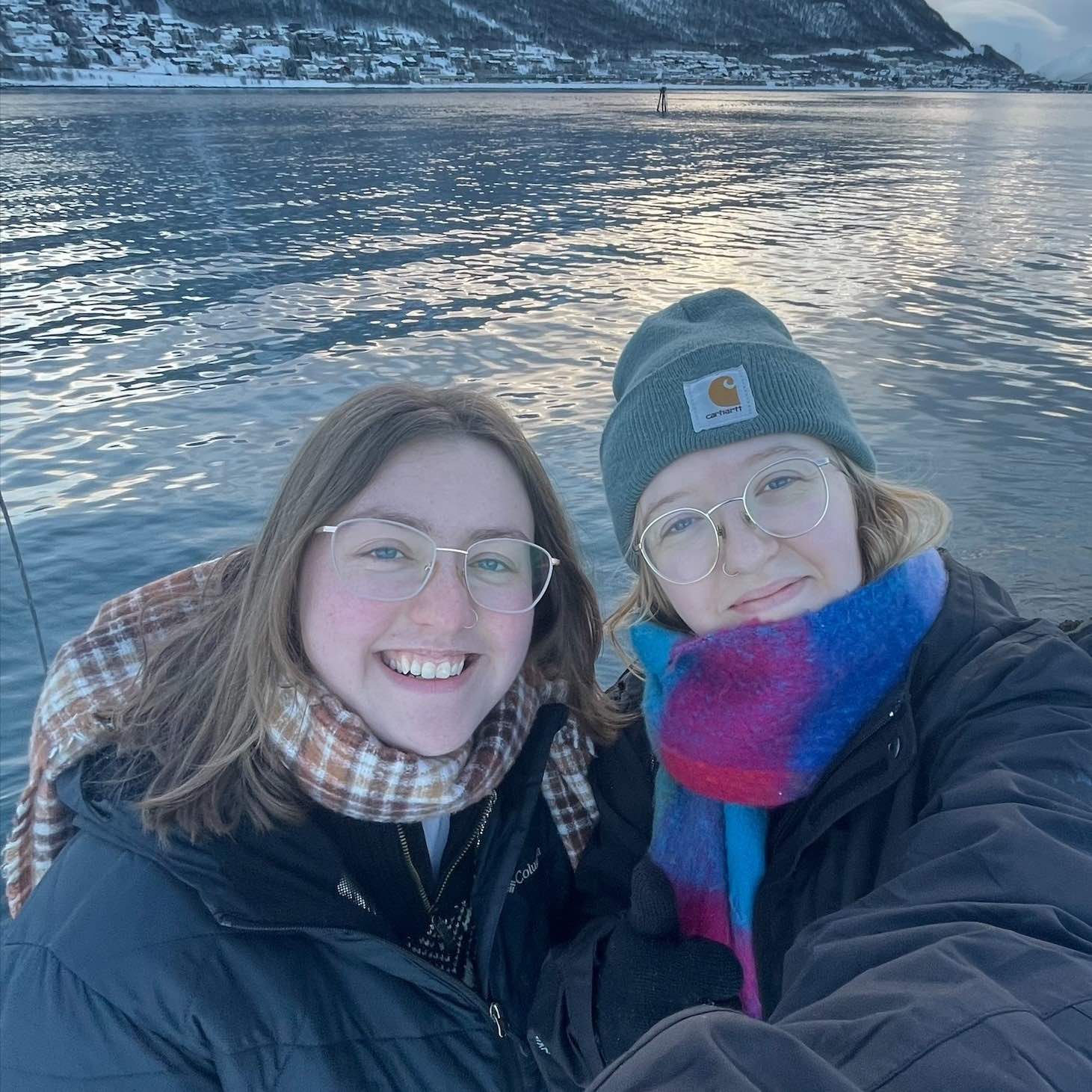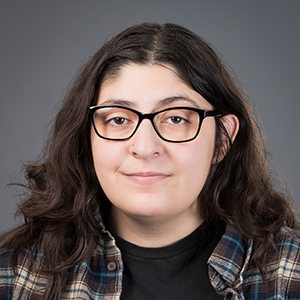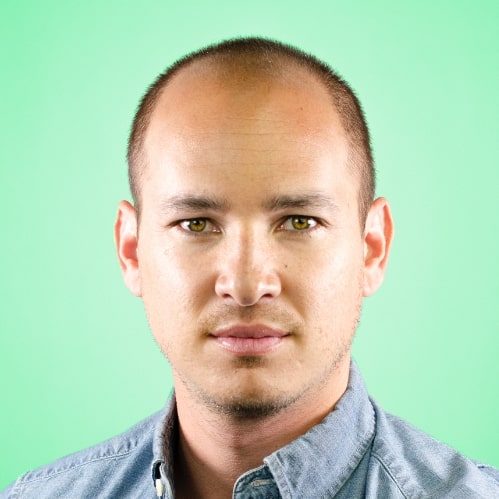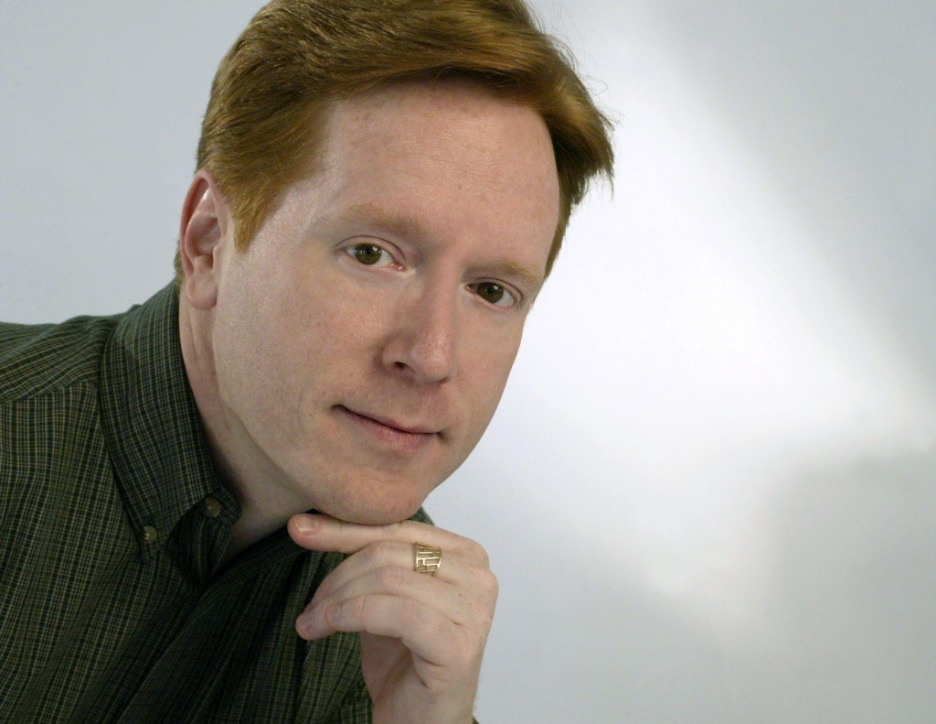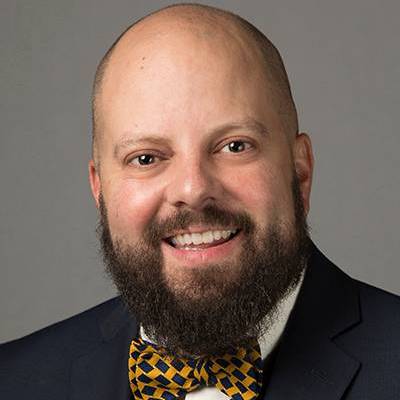
Assistant Dean of Students, Evan Welch, shares personal stories of authentic leadership and the importance of self-reflection.
My name is Evan Welch. I am the assistant Dean of students in our office of student life.
So I grew up in central Vermont, basically age zero to 18, in a very small town. And a lot of my friends now who have traveled back to see what South Royalton Vermont looks like, have a better understanding of why I am the way I am in terms of always trying to add like fun to different experiences. Cause when you're just living in the middle of the woods near cornfields that like trying to find fun and excitement can be a little bit difficult sometimes. And so I, I connect deeply with the motto of Ben and Jerry's ice cream, which was actually created about 15, 20 miles up the road from where I grew up. Their motto is if it's not fun, why do it? So I've always reflected on kind of what that means. And you know, as I've gone on in my professional career, certainly there are times and things that we have to do that are not fun.
But if we can't find joy and connect to passion and thoughtfulness and compassion and, just being a quality human being, it makes things really difficult. It makes those difficult things that much more challenging. So I think being surrounded by a group of quality folks who support us and challenge us and really ask us and inspire us to be better, is kind of where I've come and grown as an adult-ish human being.
And let's see, so over the last two years, I will say it kind of only has just been the assistant Dean of students and have really had an opportunity to spend more time focusing on staff development and relationships here in our office. And I'm profoundly happy and fulfilled with the work that I get to do with our professional staff, our graduate students here in the office. But especially our undergrad students.
I think that's, that is the reason why I get up inspired every day. Not necessarily always excited. Like I said earlier, there's, if it's not fun, why do it? And there are difficult conversations and challenging, situations and times when I screw up and times when I really screw up and need to apologize and move through difficult times. But it's really the folks that I get to work with and again, the students of UNC who, who hold me accountable and hold all of us accountable and you know, are working hard at their academics and the things they're involved with outside of the classroom and working and being part of a community and part of a family. And so these, these multiple identities that our students hold and are more often than not willing to share with us and asking us to share deeply of who we are and our identities. And I think that connects deeply with kind of my leadership philosophy and has helped me stay motivated and committed to the work of being a higher education student affairs professional.
So you're in this role as a Dean. And you know, for instance, for me, I'm a first gen don't know anything. And the only thing I know about the word Dean is like, well, he's gotta have leather bound books on the shelves, you know,
Right, leather patches on the elbows.
Right. But with that, I mean, no, like this is a very open and honest like room, I shouldn't say room, but like this area of OSL and to wear so many hats, it kinda comes down to the word authentic with leadership. So what is authentic to you? What, what does that, what does that mean?
Sure. So there are certainly, I mean, there's an authentic leadership theory, which is talks about these five different pillars of how we all work with one another. And I'm not going to get into the specifics because I always forget the specifics of theories and whatnot, but there's kind of these five components of pursuing purpose with passion, practicing solid values, leading with the heart, establishing enduring relationships and demonstrating self-discipline. And so that for me is, I read that it's like, I don't know what that means, but this kind of, this concept of compassion, thoughtfulness, passion, true self, I don't connect deeply with demonstrating self-discipline. That's one that's always kinda been a challenge to me as a kind of a free thinker, challenging authority.
And it's following your path, right? So it's not like you can't tattoo these, these five components to your arm.
Totally. The thing that connected with me deeply about this theory and kind of this concept of authenticity came from a YouTube clip that I found from a British broadcaster, CEO journalist named René Carayol and he was giving a kind of a keynote in Barcelona at a, I think it was just a gathering of European leaders. And he asked them these three questions and I'll say the one that's most impactful to me, I'll kind of share with you last. The first question was, or statement I guess is your heritage is not, your history was one of these really important things that we can screw up and learn from mistakes and look back at history and see kind of, oppression and these things that have happened and we can, we can change them. Culture is so much more important than strategy. So this kind of concept of how we want to work with one another. Who do we want to be? Kind of what does work look like?
And then the thing that stuck with me the most, he asked this question of why should anybody be led by you? Like, what is it that you bring to the leadership party that anybody should follow you? And I even get goosebumps saying that statement because I remember hearing that and being, I don't know, like, I don't know. Like I've got a position and I've got diplomas on the wall and I've worked, but I don't know what it is I bring to the leadership party. Like, I don't know. And I had this really introspective but also horrifying moment of this imposter syndrome of like, I don't know, like I hope nobody ever asks me that cause I don't, I don't know. And this not knowing and really trying to connect with what is it that I value.
And so in talking with students in the leadership class and as we kind of navigated through this concept of authentic leadership, for me it was really these concepts of relationships and connectedness and then purpose and passion. And I'll share a little kind of example. Early on in my assistant Dean role, I was asked to connect with all of the deans from each of the academic colleges on being more involved and integrated into homecoming that had asked them to, you know, host their own homecoming tent that this homecoming central and everybody from the last 50 years would come back to campus and there'd be inflatables and fireworks and it would just be amazing. So I remember getting an opportunity to go and talk before all of the deans. And as I reflect on it, I have this out of body experience where I can look down at myself talking in that room and I was using this monotone, like not me voice. And the word choice I was using was not at all who I am. I was talking to them as I thought they would have wanted me to talk in that space. So I had created this stylized fictitious version of myself that I sent to this place and it didn't go well. I could just see folks weren't connected, they weren't even listening to what I was saying. I started to, I started to get anxious and I'm like, this is a train wreck. This is awful. And what I identified after some reflection afterwards was if I'm presented with those sorts of opportunities, all I can go and do is be my authentic self and talk with inflection and talk with my hands. And more often than not, swear, and tell stories and kind of be ridiculous because that's just who I am. And if I don't get what I, if I show up as who I am, and I don't get what I need for our organization or for UNC students or whatever it is, so be it.
I think with a lot of the social identities that I hold, there's a lot of privilege wrapped up in that as well as I'm, I am as a white male, cisgendered straight person, I hold a lot of privilege and so I'm able to show up as I want to in spaces and not get criticized or held accountable for that. So I wanna honor that. In addition to, you know, utilizing that privilege in order to be demonstrative for, um, communities that don't have an opportunity to do that. So really trying to be thoughtful and conscious about that as well. And, I identify that I'm going to be me and if that doesn't work, then so be it. And then I'll need to reflect on is it something about me or how do I truly be my most authentic self? Showing my passion, showing who I am, developing relationships with folks, which has caused me to do a lot of critical reflection on those social identities and how do I show up in the world and how much space do I take up and how do I, how do I work with others who share many of my social identities to reflect on those things and kind of cause dissonance and critical reflection on what does it mean to be authentic, who is supported to be authentic, who's held accountable for being authentic, and to kind of push that a little bit further than just the super-helpful Dean of students who shows up to make the world a better place and fix everything.
You mentioned reflection a lot. How does reflection work in so many different areas? Can you take that home? I mean like, cause I just imagine that there's so much that can be brought around and it just wears on your shoulders at times. How does reflection work?
Oof, excellent question. I need to reflect on that. I mean the first thing that pops into my head is finding where our comfort zone is and where it's not and kind of pushing up against those boundaries that, you know, I think one of the main things for me is listening to hear rather than listening to find our next best argument for what the person we're talking to is. And communication is a big part as well. I remember years ago, my partner and I decided we were going to have people over for dinner. We decided the night who we were going to invite and we got to the grocery store to go grocery shopping for food, got into the store and both went in separate directions. I was like, where are you going? Like clearly we're going to make this for dinner. And she's like, no, we're going to make this for dinner. But we hadn't had a conversation about what we were actually going to make. So we had done all of the kind of the higher level communication stuff of check, check, check, check, check. And then it led to conflict at this very like minutia basic level of like, I want to make pasta, she wants to make chicken. I don't even remember what it was. But that communication is also where those, that kind of, that reflection can come in and having a good group of folks around you who you will challenge you and hold you accountable. I mean for me how I was socialized growing up, that if I am presented with a challenge, I need to spend time alone thinking about it in my own head and kind of retreating in and coming up with how do I really feel about this? But that's still just an N of one in terms of like, that's not reflection, that's internalization.
So reflection, I believe, really calls into community and whether community means books or podcasts or TV shows or like other human beings to help get, help you get a sense of who you are. Like, that's really important, it's like who am I in relation to my children? Who am I in relation to the folks that I work with? Who am I in relation to myself? Which sounds super like nebulous and ethereal, but I think really it's this, this active practice of putting myself in situations to further my knowledge, but also kind of the socio emotional, like, what am I learning about other people and systems? But how do I feel about those? I think a lot of times in higher education, and maybe just other fields as well, that's really easy to think about, something that's external to us and not recognize the impact of, like how what we do shows up.
And is connected to yourself.
Absolutely. Yeah. These kind of like a Venn diagram of this circle of like big circle of what am I learning and the circle of who am I that overlaps and kind of that, that central piece, that little eye, eyeball looking piece in the middle of that's the, that's real. So, uh, I would, I would also say for anybody who's, who's listening and is like actively wanting to engage in more reflection, there's a shame researcher named Brené Brown who's gotten all kinds of media notoriety. Lots of Ted talks, her stuff's legit. And it certainly comes from, from one perspective and the identities that she holds play into that, but talks about vulnerability and how do we communicate and how do we show up as real and authentic and what does that mean and how much it can hurt to do that. And how, um, vulnerability in leadership is really an important thing. And so as I think about what does it mean to be authentic, it really means being, being vulnerable and sharing, sharing deeply of ourselves. And I think for me that connect deeply with who our students are and the work that we all get to do. And I think for me, that's why the job that I do is so rewarding because I'm surrounded by folks who are both demonstrating vulnerability on a minute to minute, daily basis, which causes those who work with folks to also demonstrate, learn and show up as vulnerable as well.
Yeah, it's a huge responsibility too. I can't remember where I heard this, but everyone wears armor. And to take off that armor is, is so... it takes so much energy and focus and it's a relief to have, if you are in a position of, you know, of a higher administrative level. If a student sees that their armor is off, cool, that means that I can actually like at least breathe a little easier.
Yeah, I've thought a lot about that, that armor concept and how that plays into social identities as well and who is supported to take off their armor and who is expected to continue to wear armor. Um, and I think one specific thing that I will share is I remember after... I'll often people will say after we had kids, I did not have a child. I want to honor that. My wife Renee carried the child. She birthed the child. I was there. She is like, for what it's worth, I respect and understand why folks say we are pregnant. We are not. Renee was pregnant. So anyway, I got that out of the way. Not that I'm carrying that sort of weird way. But after Wesley was born, I would tell my staff like, Hey, I've got to go home home early. I need to pick up Wesley or Wesley needs this, this, that, or the other thing. And I was supported as a male identified person. Be like, 'what a great dad. Like you're taking your, you're leaving work early to go be with the kids.' I don't know that Renee or other women or caregivers or parents, who show up in the world, is female identified, get that same sort of grace or support that it's, 'Oh my gosh, they've had a child now it's going to be...' And so that armor piece is like with the identities that I hold, I was supported to take my armor off. And in the same vein, somebody with a different social identity was challenged to put more armor on.
Right.
And so I think it's interesting as we navigate those things that who's supported to be vulnerable when and where and who's then held accountable for the exact same thing in a very different way.
So I feel that whether it's cheerleading coach, whether it's interim director of leadership studies, president's leadership program, my role on campus has often been a little bit like Mary Poppins, where I go when and where I'm needed. As long as I can be helpful and further help further an organization or group. And I present myself as that to students as well, that our office is often not the last place students need to find. But I promise that we will do our absolute best to be the second to last place that you need to find. We'll have students wander in. Our office suite is directly above subway in the university center, which is truly the easiest way to describe where we are in the Northeast corner of the UC. But certainly if you, if you've got questions about anything regarding getting involved on campus, just need somebody to listen to or help assist with.
If you're not finding what you need, we will help. And so whether that's getting involved in new student club organization, Student Senate, a fraternity or sorority, peer mentorship, peer education, and just getting involved and engaged on campus in the community, we're happy to do that. That's really what we do. And I would say in terms of a sign off, one of my favorite quotes from straight up nineties movie is bill and Ted's excellent adventure. Abraham Lincoln has been time traveled back to, let's say 92. It might even be earlier than that, but at the end of his keynote address tells the students be excellent to each other. And I would say that's what I would say is practice and find your authentic self and be excellent to each other.
Music
Reverend Gary Davis - Improvisation Fast Blues in A
Podington Bear – Warbled Reflection

